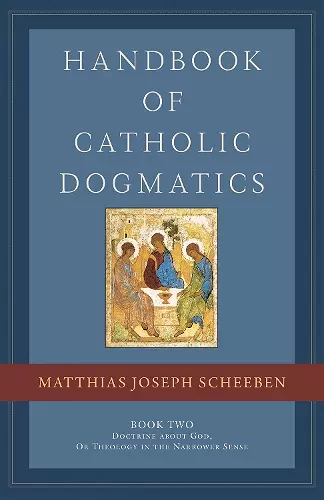Handbook of Catholic Dogmatics, Book 2
Book 2: Doctrine About God, Or Theology in the Narrower Sense
Michael J Miller author Matthias Joseph Scheeben author
Format:Hardback
Publisher:Emmaus Academic
Published:30th Jan '22
Currently unavailable, our supplier has not provided us a restock date

Volume 2 of Matthias Joseph Scheeben's Handbook of Catholic Dogmatics treats the Doctrine about God. It consists of perennially important topics such as the natural knowledge of God, analogical discourse about God, the divine perfections, and the trinitarian nature of God. Especially notable is Scheeben's identification of God's absolute beauty as a discrete attribute.
His treatment of the divine life (intellect and will) is similarly rewarding and serves as the transition point to the Trinity of persons. Scheeben's treatise on the Trinity begins with an overview of Magisterial definitions as well as a survey of the development of the doctrine of the Trinity in the Ante-Nicene Patristic tradition. What follows is another noteworthy aspect of Scheeben's theology proper. His careful treatment of the Spirit's procession enables a fruitful attempt at reconciling the divergent Western and Eastern Patristic conceptions thereof that underlie later disputes about the Filioque.
Scheeben's work is a high point of Catholic theology in terms of rigor, learning, and internal organization. The present volume, on God the One and Three, exemplifies these qualities to the full. If forced to choose, I would single out in particular two features of his presentation. The first is his rich account of the Wisdom of God, seen as the principal conceptual key for an apprehension of the divine life, a teaching which creates an affinity with the Russian Sophiologists of the later nineteenth and twentieth centuries, Scheeben's harsh account of the origins of the Byzantine schism notwithstanding. The second is the inspirational beauty of his teaching on the interior missions of the Son and the Spirit, so different in their frank supernaturality from the Christological humanism and Pneumatological environmentalism to which, in a truncated attempt at immediate 'relevance,' these realities are often reduced today." - Fr. Aidan Nichols, O.P. St. Michael's Seminary and Theological College, Kingston, Jamaica
"God as a Trinity of Persons is the source and summit of all the Christian mysteries. From this mystery flows the Incarnation, Redemption, the Church and Sacraments, and Eschatology, all of which are the divine means by, in, and through which human beings are to be taken up into the very life of the Trinity itself. In his second volume of his Handbook of Catholic Dogmatics, Matthias Joseph Scheeben treats this most marvelous mystery—The Doctrine of God. He follows the design laid out by Thomas Aquinas in his Summa Theologica; that is, he considers first the knowledge of God that can be obtained through reason alone, and then he proceeds to investigate the supernatural revealed doctrine of the Trinity. In both instances, Scheeben demonstrates that he is truly a master of philosophy and of theology. Moreover, although this is an academic text, Scheeben articulates his thought with clarity, creativity, and insight. The mystery of God, in all of its fullness, shines forth with the grandeur of its incomprehensible beauty. Truly, Scheeben exemplifies the Anselmian virtue of faith seeking understanding." - Fr. Thomas G. Weinandy, O.F.M., Cap. Member of the Vatican's International Theological Commission
"It is almost impossible to overstate the significance of an English translation of Matthias Joseph Scheeben's Handbuch der katholischen Dogmatik. Of the various attempts to restore Catholic theology after the revolutions of the eighteenth and nineteenth centuries, none has been greater than Scheeben's. Heir to the historical dogmatics of Petavius and Thomassin—two masterpieces from which he drank deeply—Scheeben was as comfortable with the Greek Fathers as he was with theologians of the baroque age. Augustine and Aquinas remain touchstones in Book Two (as they should), but their insights are bolstered and extended in conversation with now-forgotten masters like the Jesuit Diego Ruiz de Montoya, the Franciscan Claude Frassen, the Carmelite Philip of the Blessed Trinity, and the Benedictine José Sáenz de Aguirre. Here, the reader is treated to the very best of Scheeben—his account of the doctrine of God, His substance and attributes, His knowledge and will; the proofs for His existence; and (last but certainly not least) Scheeben's profound account of the Most Holy Trinity. I know of no better source for the aspiring theologian who wishes to behold the continuity and complexity of the Catholic theological tradition at its grandest." - Trent Pomplun University of Notre Dame
"In a treatise still unsurpassed for its combination of historical breadth and analytic rigor, Scheeben's Gotteslehre brings readers to the heart of the divine mystery. Its balanced attention to dogmatic posits and speculative elaborations; to the contributions of the Thomist, Franciscan, and Jesuit 'schools'; and to the majestic simplicity and aesthetic vitality of God all make The Doctrine of God obligatory reading for any serious student of the subject. Scheeben's palpable reverence for the Greek fathers, conciliatory treatment of the filioque, and differentiated model of divine simplicity will prove especially intriguing for those committed to Eastern-Western ecumenism. We owe Michael J. Miller a debt of gratitude for rendering Scheeben's dense German into elegant and accurate English." - Fr. Aaron Pidel, S.J. Marquette University
ISBN: 9781645851462
Dimensions: unknown
Weight: 809g
712 pages